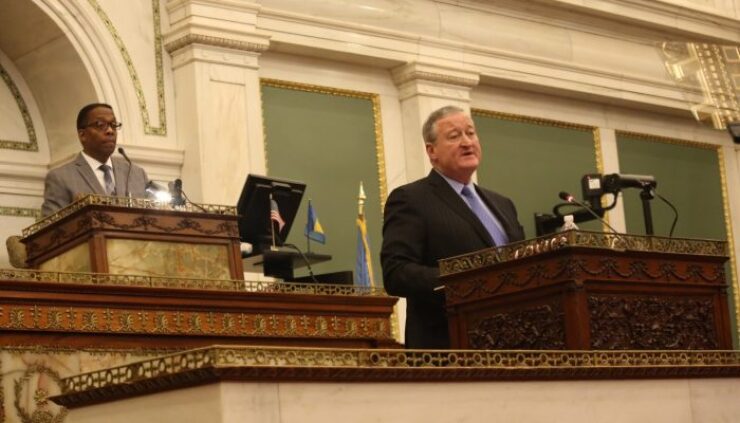A budget plan pitched by Philadelphia Mayor Jim Kenney Thursday seeks new tax revenues to help the city’s cash-strapped school district erase a massive deficit.
Kenney said while proposing his $4.7 billion 2019 fiscal year budget he will ask the city council for a 6% property tax hike to aid Pennsylvania’s largest district, which is projected to run a $900 million deficit by 2023. The nation’s ninth-biggest school system has no independent revenue raising ability and is entirely reliant on support from Philadelphia and Pennsylvania. The state-dominated School Reform Commission, which has governed the junk-rated district since December 2001, voted last November to return to

“As we return to local control of schools, we must provide the financial stability the district needs so our students and schools can continue building on the real progress they’ve made in recent years,” said Kenney in his budget remarks. “While we continue to press the Commonwealth to meet its constitutional requirement to fund schools adequately, we can no longer afford to wait for other people to act.”
Kenney said a 6% property tax increase would bring the school district $475 million over five years. The Democratic mayor also suggested readjusting scheduled reductions in the city’s wage tax to net an additional $340 million for the district with a jump in the local portion of the real estate transfer tax creating $66 million. He also proposed using existing revenues to boost the city’s contribution to the school system by $20 million annually for the next five years.
“All told, this package will mean an additional $980 million dollars to the children of Philadelphia over five years,” said Kenney. “We need to step up and provide the financial stability and the accountability that our district needs.”
Moody’s Investors Service upgraded Philadelphia’s public school system one notch to Ba2 in September, citing “considerable improvement in the district's still strained financial position.” Moody’s also revised the outlook on the district’s roughly $3 billion of debt to positive from stable. The district has an enhanced A2 bond rating from Moody’s on direct general obligation debt thanks to the Pennsylvania School District Fiscal Agent Agreement Intercept Program, which allows the state treasurer to withhold state aid and make payments directly to the bond trustee.
“Reliable school funding is key,” said Janney Capital Markets municipal analyst Alan Schankel. “The proposed property tax increase in the fiscal year 2019 budget, especially now that the district is returning to local control, sends a strong signal that the city is serious about supporting its schools. “
Villanova University School of Business professor David Fiorenza said Kenney's tax hike does not address its escalating costs driven largely by unfunded obligations defended by strong unions. He noted that first full of year of Philadelphia's new sugary beverage tax came in $12.2 million
"I don't think they have a revenue problem, they have a spending problem," said Fiorenza.
Kenney's
Philadelphia general obligation bonds are rated A2 by Moody’s with a negative outlook. S&P Global Ratings rates the city’s debt A-plus and Fitch Ratings gives it an A-minus.
Moody’s noted in a Feb. 21 report that Philadelphia is benefiting economically from an expansion of the city’s many universities and hospitals. While these properties are tax-exempt, Moody’s analyst Christopher Coviello said they are spurring demand for new retail, commercial and residential development that will generate new revenues.
“As the city's population, socioeconomic profile and economic base strengthen, Philadelphia will benefit from healthier tax revenues that should provide added financial flexibility,” said Coviello in the report. “This added flexibility is a crucial tool for the city as it addresses its thin reserves and high fixed costs.”





